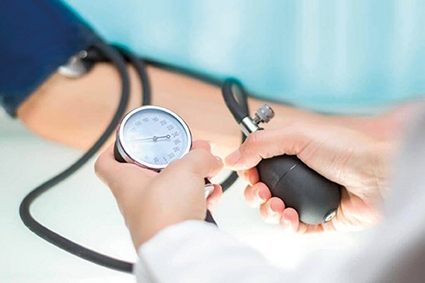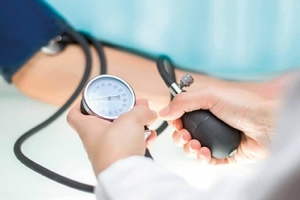Raising Awareness of Hypertension
Adequate control of blood pressure significantly reduces the risk of brain stroke and cardiovascular disease. This year, the world has announced May as the month of hypertension, kicking off the campaign “Check your pressure – I say this for you.” The campaign is a social and global project promoting the prevention and management of cardiovascular disease (hypertension) in Georgia and throughout the world.
According to the latest data, about 1.2 billion people worldwide are fighting hypertension, a rate in constant growth. The current campaign addresses the key issues in the fight and intends to increase awareness of the disease within society. Encouraging young people will further motivate their parents and relatives to check their pressure and better monitor the disease. Informing the public about hypertension is imperative in fighting the disease.
"Arterial hypertension is a disease in which we observe increased blood pressure by a tenth as compared to the normal pressure level,” explains Gigi Khabeishvili, Doctor, Cardiologist and Head of the Euromedi clinic. “Statistically, according to some research carried out in the last few years, hypertension is the most common disease in Georgia, with approximately 30-40% of the population affected. Arterial hypertension, at the initial stage, can occur for a long period without complaints, symptoms or indicators. Often, people with hypertension do not control their blood pressure or see the necessity to do so. The first signs of the disease can occur after complications develop. Hypertension is not characterized by any specific complaints; it is often revealed after checking blood pressure and can be accompanied by headaches, dizziness or fatigue. As the blood pressure increases, a person develops shortness of breath, insufficiency of air, accelerated heart rate during physical activity, pain in the heart area and sometimes bleeding of the nose, sensation of pulsation in the head and redness of the skin. Heart and blood vessels are often damaged during arterial hypertension, as are the brain, heart muscle and kidneys. A headache, vomiting, faintness and loss of vision are present in the case of damaged brain vessels. If the problem occurs in the heart, it is expressed by arrhythmia or lack of air.”
Zviad Kipiani, Head of the Cardiology Department of New Hospital, notes that after a certain age, an increase in arterial pressure is detectable and that, fortunately, it is very rare among children and young adults if they do not belong to a particular risk group.
In general, few people control their blood pressure before and after physical exercise. Kipiani explains to what extent this statement is true: “This is a global problem. Unfortunately, not all gyms have resources to employ a doctor unless it is a rehabilitation center. When a person goes to the gym, it is necessary for the gym to ask the person for a special test which shows blood pressure levels, the presence of hypertension, pulse rate changes and to what extent a person can be physically active,” he says. “It is important to have an electric cardiogram before any physical activity, particularly before exercising and when the person is not generally physically active. Sudden death is a very serious problem that can occur among youth who go to the gym or even play football. Therefore, it is critical to take the test after a certain age. If a person has blood pressure and knows about it, it is essential to first check the pressure and then start training.”
As specialists explain, the main causes of death today are cardiovascular diseases. The World Health Organization estimates that in 2012, 17.5 million people died as a result. Of these, 7.4 million died due to ischemic heart disease and 6.7 million due to a stroke.
80% of such deaths can be avoided by modifying the risk factors that aid the development of cardiovascular disease and increase the likelihood of a lethal outcome. Arterial hypertension holds the leading position among these factors.
To illustrate the scope of the problem, the following data is sufficient: 9.4 million deaths per year are related to arterial hypertension; three out of every ten adults have high blood pressure; almost half of the 1.8 billion people suffering from hypertension are unaware of it; many of those who are aware do not proceed with treatment. Due to this, arterial hypertension is one of the most vital medical problems in the modern world. Georgia faces a worse problem than the average situation – out of ten deaths, five are caused by arterial hypertension. What is more alarming is that three out of five people with hypertension are not being treated.
“Part of society is uninformed about hypertension, another part knows but fails to pay enough attention,” says Professor Zurab Paghava, Head of N. Bochua’s Vascular and Cardiovascular Clinic. “The main aim of the #checkyourbloodpressure campaign is to increase awareness of the causes and risks associated with hypertension. It is imperative to ask everyone to measure their blood pressure and in case of high blood pressure, consult a doctor for diagnosis and treatment. Everyone has blood pressure. Generally, blood pressure helps a person adapt to the environment. When a human organism needs more blood, more oxygen, pressure levels increase. When there is no need, pressure levels are regulated. An increase in blood pressure indicates that particular pathological processes are taking place in the human body which, in turn, raise blood pressure levels and holds them for a long period of time.”
The main goal of the campaign #checkyourbloodpressure is to focus on young adults and motivate them to encourage parents, other relatives, and friends to take care of their health. Children should urge parents not to ignore high blood pressure, systematically measure their pressure, get diagnosed in time, and more importantly, start treatment.












